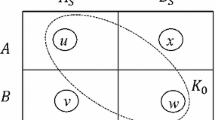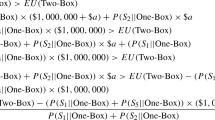Abstract
Nicholas Rescher claims that rational decision theory “may leave us in the lurch”, because there are two apparently acceptable ways of applying “the standard machinery of expected-value analysis” to his Dr. Psycho paradox which recommend contradictory actions. He detects a similar contradiction in Newcomb’s problem. We consider his claims from the point of view of both Bayesian decision theory and causal decision theory. In Dr. Psycho and in Newcomb’s Problem, Rescher has used premisses about probabilities which he assumes to be independent. From the former point of view, we show that the probability premisses are not independent but inconsistent, and their inconsistency is provable within probability theory alone. From the latter point of view, we show that their consistency can be saved, but then the contradictory recommendations evaporate. Consequently, whether one subscribes to evidential or causal decision theory, rational decision theory is not in any way vitiated by Rescher’s arguments.
Similar content being viewed by others
References
M. Capinski P. E. Kopp (1999) Measure, Integral, and Probability Springer London, New York
Gibbard, A. and W. L. Harper: 1978, ‘Counterfactuals and Two Kinds of Expected Utility’, in Hooker, Leach, and McLennen (eds.), Foundations and Applications of Decision Theory, Reidel, Dordrecht. Reprinted in Harper, Stalnaker, and Pearce (eds.), Ifs, (1981, Reidel, Dordrecht), from which page references are taken
R. C. Jeffrey (1983) The Logic of Decision EditionNumber2 University of Chicago Press Chicago
I. Levi (1975) ArticleTitle‘Newcomb’s Many Problems’ Theory and Decision 6 161–175 Occurrence Handle10.1007/BF00169104
Lewis, D.: 1981, ‘Causal Decision Theory’, Australasian Journal of Philosophy 59, pp. 5–30, reprinted in his Philosophical Papers II, pp. 305–339 (1986, Oxford University Press: Oxford), from which page references are taken
H. Price (1986) ArticleTitle‘Against Causal Decision Theory’ Synthese 67 195–212 Occurrence Handle10.1007/BF00540068
Rescher, N.: 2001, Paradoxes, Chicago and La Salle, Ill, Open Court
Author information
Authors and Affiliations
Corresponding author
Additional information
Manuscript submitted 1 February 2004 Final version received 17 May 2005
Rights and permissions
About this article
Cite this article
Clark, M., Shackel, N. The Dr. Psycho Paradox and Newcomb’s Problem. Erkenntnis 64, 85–100 (2006). https://doi.org/10.1007/s10670-005-7515-y
Issue Date:
DOI: https://doi.org/10.1007/s10670-005-7515-y




